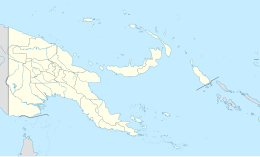New Hanover Island, (German: Neuhannover), also called Lavongai, is a large volcanic island in the New Ireland Province of Papua New Guinea. This region is part of the Bismarck Archipelago and lies at 2°30′S 150°15′E / 2.5°S 150.25°E. Measuring some 460 square miles (1,200 km2), it had a population of 5,000 in 1960, which increased to approximately 17,160 by 2000.[1]
 New Hanover closeup map | |
| Geography | |
|---|---|
| Coordinates | 2°30′S 150°15′E / 2.5°S 150.25°E |
| Archipelago | Bismarck Archipelago |
| Area | 1,186 km2 (458 sq mi) |
| Length | 60 km (37 mi) |
| Width | 30 km (19 mi) |
| Highest elevation | 900 m (3000 ft) |
| Administration | |
Papua New Guinea | |
| Province | New Ireland Province |
| District | Kavieng District |
| LLG | Lavongai Rural LLG |
| Demographics | |
| Population | 17,160 (2000) |
| Pop. density | 15.4/km2 (39.9/sq mi) |
In the interior the Tirpitz Range reaches a height of 2,800 feet.[2]
Culture
editFriedrich Ratzel in The History of Mankind[3] reported in 1896, when discussing Melanesian ornament, that there were luxurious feather ornament displays in New Hanover, showing much taste in the combination of forms and colours with vegetable fibres and beads on sticks. An example was a delicately formed face in feather-mosaic forming the head of a hairpin.
See also
edit- Johnson cult (so-called)
- List of volcanoes in Papua New Guinea
References
edit- ^ PNG National Statistical Office: Census Unit Register, 2000.
- ^
The Handbook of Papua and New Guinea. Vol. 3. Pacific Publications. 1961. p. 10. Retrieved 2020-06-05.
The highest peak in the interior range (Tirpitz Range) is 2,800 ft; the interior is well-watered, and mostly jungled, with grassy plains in the south.
- ^ Ratzel, Friedrich. The History of Mankind. (London: MacMillan, 1896). URL: www.inquirewithin.biz/history/american_pacific/oceania/melanesian-ornament.htm Archived 2011-07-06 at the Wayback Machine accessed 21 October 2009.
External links
edit- . Collier's New Encyclopedia. 1921.
